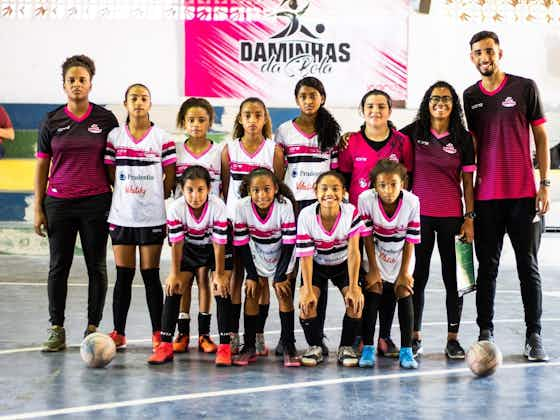The Guardian
·23 July 2023
‘Football’s little ladies’: Brazilian girls prepare for future Women’s World Cups

The Guardian
·23 July 2023

Thaissan Passos grew up playing football with her male cousins on the streets of the Beira-Mar favela in Duque de Caxias, a city in Rio de Janeiro’s sprawling suburbs. When the boys progressed to proper practice, she wanted to join too – but the football club wouldn’t take girls.
“I was so frustrated,” recalls the 37-year-old, wiping away tears as she recounts the innumerable obstacles she faced in her attempts to play football, her only refuge from a violent home. Persistence paid off and Passos built a career in the sport, first as a goalkeeper, then as a coach, and then as the founder of a project offering free football practice for girls, so that “not a single other girl does not feel welcomed by the sport that saved me”.
Related: Moving the Goalposts | How good are Brazil and how far can they go at the Women’s World Cup?
More Brazilians than ever before are expected to cheer on the female Seleção this year, which will confront Panama in its first match of the Women’s World Cup on Monday. But in a country that long excluded women from the beautiful game as a matter of state policy, girls who dream of following in the footsteps of superstars like Marta still struggle with inadequate infrastructure and sexist stereotypes.
Things have come a long way since a 1941 decree prohibited women from practising sports that were “incompatible with their female nature”. The ban on women’s football was only properly lifted in the early 1980s and much of the progress has happened in just the last four years, amid global efforts to boost the sport.
Since 2019, clubs competing in male leagues organised by the Brazilian and South American football confederations have been obliged to have a professional female team. That year was also the first time Brazil’s main TV network, Globo, broadcast the Women’s World Cup on its free-to-air channel.
Women’s football is around today thanks to a lot of persistence and fighting Globo football commentator Renata Mendonça
“Women’s football is around today thanks to a lot of persistence and fighting, so it’s an achievement,” says Renata Mendonça, a Globo football commentator and co-founder of Dibradoras, a website covering women in sport.
The women running Daminhas da Bola in Duque de Caxias still contend with all kinds of prejudice. “We face a lot of pushback and questioning because we are women training girls,” says Joice Barros, 36, the project’s coordinator and one of its four volunteer coaches.
The project’s very name, which means “football’s little ladies”, is a tongue-in-cheek response to the everyday sexism faced by football-loving girls. “I’d get called all kinds of names [playing] on the street as a child, but never a lady,” says Passos in a pitchside chat as 40-odd girls undergo a rigorous two-hour practice on a recent Monday afternoon.
A number of former “little ladies” – many of whom come from vulnerable backgrounds – are now making it in professional football. The project has alumnae in all the youth divisions of the national team, and even one in Brazil’s adult squad.
“It’s news to no one that the project trains athletes and changes women’s lives. Yet with all these years of work, all these athletes we’ve produced, we still don’t have a sponsor,” sighs Barros. “I bet you, if this were a project for boys, we’d be getting sponsorship.”
It is not just in football that Brazilian women are still battling for equal opportunities. “Society is extremely sexist,” says Milena Roza, 25, a Daminhas alumna who now coaches the new generation of aspiring athletes. “The labour market, football, sport, leadership positions … We’re fighting these barriers everywhere.”
Women on average earn 22% less than men in Brazil and comprise just 18% of representatives in the national congress – below the global average of 26.5%.
“There’s a paradox [in Brazil]: on the one hand you have an advanced legal framework, and on the other you have the presence of a culture with a deeply unequal perspective on gender which pervades behaviour and public policy,” says Jacqueline Pitanguy, a former head of the national women’s council and founder of Cepia, a non-profit human rights group.
Pitanguy adds that the “patriarchal ideology” and “toxic masculinity” of the previous Jair Bolsonaro government drove setbacks. All forms of gender-based violence increased during the last four years, according to the Brazilian Public Security Forum, a trend researchers put down to reduced funding and a rise in ultraconservative movements under Bolsonaro.
Tackling this backsliding requires “urgent cultural changes, with important efforts from the government too”, says Lívia de Souza, a researcher on violence, gender and health at the Fiocruz Minas public health institute.
The administration of Luiz Inácio Lula da Silva appears serious about addressing gender inequality. Lula this month signed off on a law enforcing equal pay between men and women, part of a package of gender equality measures unveiled earlier this year. The senate, meanwhile, is considering a proposal to make misogyny a crime. Yet the leftist leader has also disappointed at times, showing little commitment to increasing female representation in the supreme court, for example.
“There’s still a lot to do … but now there are new opportunities, renewed hope,” says Pitanguy.
That sense of hope is palpable among the determined Daminhas girls, who come from all over greater Rio to practise on a peaceful grass pitch overlooked in the distance by the spectacular Serra dos Órgãos mountain range. “I never listened to the criticism,” says Maria Eduarda Brito, 13, whose dip-dyed hair matches her pink-and-black football kit.






























































